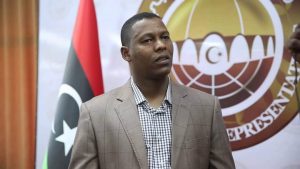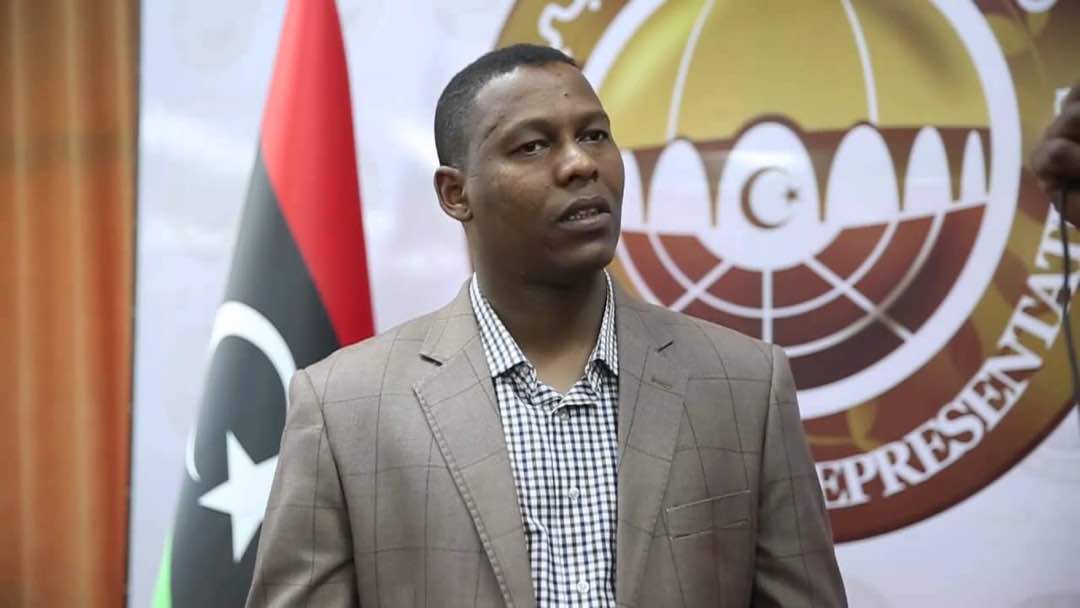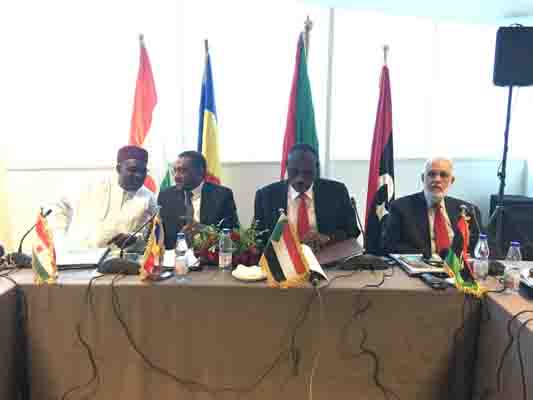By Sami Zaptia.

London, 10 August 2018:
The Tuareg House of Representatives member Saleh Hammah (Bakada) said that his people will not be used by Siaf Al-Islam Qaddafi as a means to political ends.
Speaking today exclusively to Libya Herald by phone, Hammah, was responding to an alleged attack on the Tuareg people by Saif Qaddafi in a recording widely circulated on social media. In the audio recording purporting to be of Saif Qaddafi, Saif accused the Tuaregs, according to Hammah, of ‘‘treason’’ against the Libyan cause and of being in contact with ‘‘foreign agents’’.
Hammah is a leading representative of the Libyan Tuareg ethnic minority, being a member of the House of Representatives (HoR) and of the 2015 Skhirat negotiation committee. He does not deny his former friendship with Saif nor the allegiance of his Tuareg people with the former regime. Indeed, he openly admitted that the Tuareg had initially stood by the former regime in opposition to the NATO attack.
However, he now believes that there is no way back for the former regime – through the use of force – and sees dialogue and reconciliation as the only viable political tool for Libya’s future.
Reviewing where Libya has reached since the Skhirat Libyan Political Agreement (LPA), Hammah expressed his disappointment on the LPA’s lack of progress.
The LPA had three main pillars for the Presidency Council and Government of National Accord (PC/GNA) to work on; security, economy and national reconciliation, he explained, but it failed in all three, he added.
With regards to the ‘‘security file, the PC/GNA left the security file closed and made no efforts in whatsoever’’. He was particularly unimpressed by the PC/GNA’s security efforts in the south of Libya which has seen much ethnic/tribal-based fighting.
‘‘And in the economic file’’, he continued, ‘‘the recent bread crisis, price increases, essential goods shortages and the black-market foreign exchange rates, despite billions of dinars and dollars being expended by the PC/GNA, have led to no positive results’’.
‘‘The ongoing talk of economic reforms has been just a matter of headlines. In reality, the PC/GNA is standing in one corner whilst the Central Bank of Libya is in another. This is not the national accord that we worked and made concessions for. The PC/GNA has chosen to work unilaterally failing to even meet for months’’.
On the reconciliation issue, Hammah said that this is a ‘‘complex and multi-layered file. It is both horizontal and vertical in that there needs to be reconciliation between the main supporters of the Libyan 17 February revolution and those who opposed it. On the other hand, there needs to be reconciliation work between the 17 February supporters. Between towns, cities, regions and political streams’’.
Hammah is critical of the achievements and the way the PC/GNA has gone about implementing national reconciliation. ‘‘This is not how to achieve reconciliation and accord’’, he added.
Returning to the alleged story that Saif al-Islam Qaddafi had requested the Tuaregs of the southern town of Ghat to muster a few thousand soldiers ready for his call to action. Their alleged subsequent refusal to comply led to Saif labelling them as ‘‘traitors’’ and of being in contact with ‘‘foreign agents’’, Hammah claimed. The Tuareg political and social leadership were disturbed by the whole incident, Hammah said, and asked him to publicly refute it.
Asked by this author if he and his people were confident of the veracity of the alleged Saif audio recording and the possibility that Saif was neither alive, nor free, and that the whole episode could be no more than a clever publicity and marketing ploy by Saif’s supporters, Hammah agreed to the possibility.
However, he said that the alleged comments of ‘‘traitors’’ and in contact with ‘‘foreign agents’’ were an insult to the Tuareg people and that despite the passage of some time since the Saif audio recording surfaced, none of Saif’s main supporters, representatives or his lawyer had publicly refuted it. It was important to defend the Tuareg people he explained.
The Tuareg people ‘‘opposed the NATO operation initially, but we supported the nation when its security and unity were at stake. Tuaregs were active during the revolution across Libya. We will not now be used as fuel for a civil war’’.
‘‘We have learnt from our history and experience that dialogue and reconciliation are the only way to peace. Libya cannot be taken by force, only by agreement and dialogue with the Libyan people. Only through national reconciliation as has occurred in other countries such as Algeria, Rwanda and South Africa’’.
Hammah denounced Saif’s efforts in the lead-up to the 17 February revolution and accused him of being in contact of foreign agents. He accused him of taking unilateral steps and failing to seek a path of reconciliation – which he said ultimately led to the collapse of his father’s regime.
‘‘Real courageous politicians know how to apologise and admit their mistakes. The Tuaregs will not be the means to achieving political aims by any party. We seek peace and stability for us and all Libyans’’, Hammah concluded.
https://www.libyaherald.com/2015/12/17/government-of-national-accord-deal-signed-in-skirhat/








